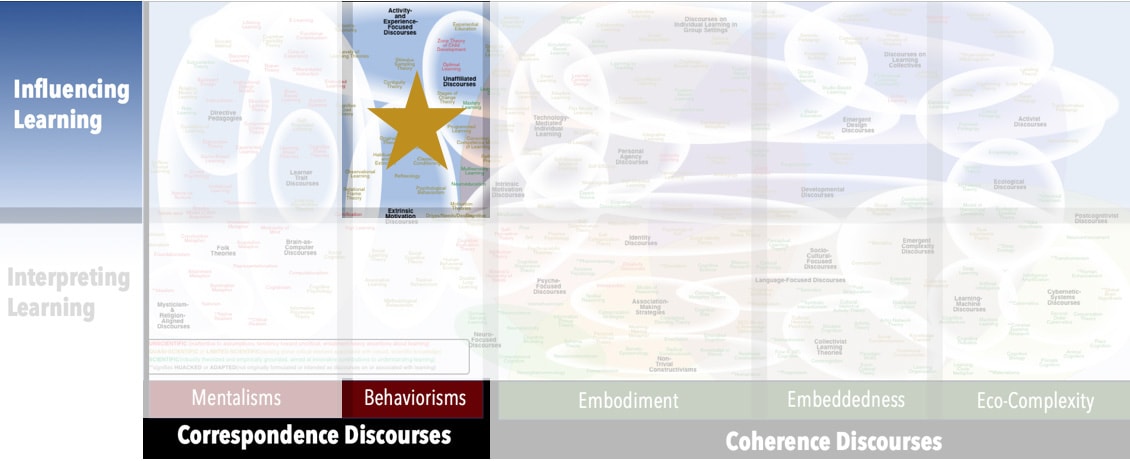AKA
Psychoreflexology
Focus
Affecting reflexes and other involuntary behaviors by manipulating environmental stimuliPrincipal Metaphors
- Knowledge is … repertoire of behaviors
- Knowing is … behaving (triggered by stimuli)
- Learner is … an organism-in-context
- Learning is … changes in behavior (specifically: associating stimuli with reflexive responses)
- Teaching is … classical conditioning (training the subject to manifest a reflexive response when a stimulus is presented)
Originated
1890sSynopsis
Reflexology is a theory of conditioned reflexes – that is, of associations between environmental triggers and reflexive, nonvoluntary behaviors that are not under the learners’ control.- Collective Reflexology (Vladimir Bekhterev, 1920s) – Based on redefinition of “reflex” as a reflected flow of energy (vs. muscle twitches, etc.), Collective Reflexology is an attempt at a theory of social and cultural action based on transformations of energy inputs into energy outputs. In effect, Collective Reflexology was aimed ate a “physics of reflexes” that worked across multiple levels of human organization, founded on the conviction that a fully objective account of human functioning is possible.
Commentary
Bekhterev’s Reflexology is very similar to Pavlov’s Classical Conditioning. In fact, although developed independently, both arose at about the same time in 19th-century Russia. Among Behaviorisms, Pavlov’s theory became better known because John Watson encountered it first and incorporated into his famous version. Ironically, Bekhterev’s work might have been a better fit for Watson’s theory. Whereas Pavlov’s work had limited applicability to human learning, Bekhterev was able to demonstrate the applicability of conditioned reflexes in humans by using mild electrical stimulations. With regard to formal education, the same criticism that apply to Classical Conditioning also apply to Reflexology.Authors and/or Prominent Influences
Vladimir BekhterevStatus as a Theory of Learning
Reflexology is a theory of learning.Status as a Theory of Teaching
Arguably Reflexology is a more appropriately seen as a theory of teaching than a theory of learning. With its focus on manipulating behavior, Reflexology falls among mechanistic conceptions of teaching associated with Correspondence Discourses on learning.Status as a Scientific Theory
Within the very limited scope of reflexive behaviors, Reflexology is a scientific theory – that is, its foci, processes, and interpretations and are clearly articulated and supported by a substantial body of uncontradicted evidence. However, it falls well short of a theory that can inform activity in formal education, and so in our analysis is classified as a limited scientific theory.Subdiscourses:
- Collective Reflexology
Map Location

Please cite this article as:
Davis, B., & Francis, K. (2022). “Reflexology” in Discourses on Learning in Education. https://learningdiscourses.com.
⇦ Back to Map
⇦ Back to List
